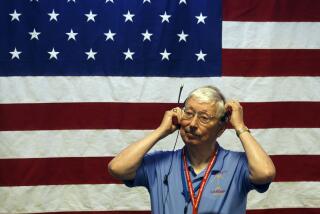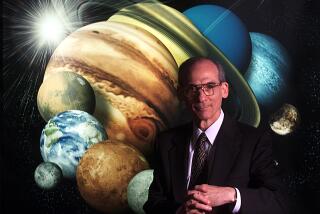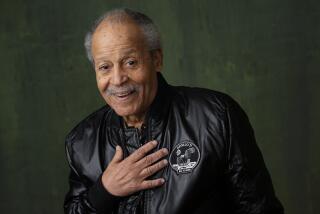Mischief a Specialty for Mir’s Doctor in Residence
- Share via
SPACE CENTER, Houston — Flight controllers blanched when the distress call came from Mir.
Twelve months into his record-smashing mission, cosmonaut Valery Polyakov had an ear full of wax. What should he do?
Doctors at Russia’s Mission Control outside Moscow hurled questions at Polyakov, who by then had spent more time in space than any other human. Specialists convened. Finally, advanced medical equipment was sent to Mir on the next supply ship.
Polyakov--Dr. Polyakov--laughed as he recalled the commotion almost three years ago. Sipping coffee after an autumn lecture to 50 Houston-area space medicine specialists, including a couple of NASA astronauts, he said through a translator that the earwax was, basically, a joke.
“I decided to amuse them, to provide them with something to do.”
It wasn’t the first time during his 14 1/2 months in space that Polyakov had tested doctors on the ground. As deputy director of Russia’s Institute for Biomedical Problems, he was their boss.
On occasion, he feigned illness to see whether they could provide prompt and proper medical support. And he didn’t wait for the fancy gadgets on the supply ship to remove the wax.
“The good thing is, now we realize that plugged ears may develop in orbit,” Polyakov said, “and now the medical kit is equipped with a certain drug just to take care of that.”
He adds with a grin, “I never provoked them again.”
*
After a world-record 679 days in space--241 days on his first Mir mission and 438 days on his second, the longest by anyone--the 55-year-old grandfather is as refreshingly playful and as big a tease as ever.
Here’s how this self-described Man of the Heavens summed up his space performance:
“Once I tried to calculate the number of orbits I made during those two flights, but my calculator almost failed. Eventually, I had 10,864 orbits all in all, and I think you can consider me an American because half of my time I spent watching the U.S.”
And his account of ongoing medical tests: “I keep asking my colleagues whether they have completed data processing [and tell them] you should be really very grateful to me because I have provided your employment for 10 years despite that chaos which reigns in Russia.”
The cosmonaut-physician, who seemed fit and relaxed, said he is living proof that humans could endure a flight to Mars, that their bones wouldn’t become dangerously brittle, their muscles uselessly shriveled and their minds helplessly crazed.
That’s why he volunteered for Mir, despite his wife’s tears. He actually proposed living on the space station for up to 24 months, but his launch was delayed by rocket trouble and he had to settle for 437 days, 17 hours, or about 14 1/2 months.
Polyakov was aloft from Jan. 8, 1994, until March 22, 1995--72 days longer than two Russians nearly a decade before him and 250 days longer than NASA’s Shannon Lucid, who owns the world endurance record for women and the U.S. record for all astronauts.
“He was asked to do something that nobody had ever done before, and he just did it. He gutted it out,” said David Leestma, director of NASA’s flight crew operations and an ex-astronaut.
“That’s a real effort to be away from everything. I mean, you are really isolated. They talk about the French Foreign Legion. Man, this is really . . . you’re in the Sahara Desert and there’s just no way around it.”
*
Polyakov’s record likely will stand until someone travels to Mars. He returned from Mir in remarkably good health, taking 20 unassisted steps from his Soyuz capsule on the snowy steppes of Kazakhstan. Nonetheless, future trips planned by Russia or NASA are to be kept in the six-month range.
“Your productivity, I think, goes way down,” Leestma says. “I think it starts around four months, personally.”
NASA astronaut Michael Foale knew his productivity was slipping by the end of his 4 1/2-month Mir mission in early October. Part of that was “get-home-itis.” And part was accumulated stress from a cargo ship collision and frequent computer breakdowns and power outages.
Polyakov insisted he enjoyed his time on Mir.
“I used to say to myself, ‘Oh, I have so many days left.’ Well, by the end of the flight, I said, ‘So few days left, and I have not done this or that and so I won’t have time to finish.’
“Probably we should explain to your readers that I had a very, very interesting and exciting science program to perform.”
He performed more than 50 studies that encompassed more than 1,000 tests, measurements or examinations.
The flight took a physical toll, as he knew it would. He lost a good portion of red blood cells until he adjusted the oxygen in the Mir atmosphere. His bone density also decreased by 15% during the mission, although he regained 12% within six months of returning to Earth’s gravity.
The bone loss would have been worse, he said, if he hadn’t exercised two hours every day on Mir’s stationary cycle and treadmill. And recovery would have been speedier if he had exercised regularly after returning to Earth.
“Unfortunately, I spent most of my time traveling and giving interviews,” he said. “It was a lot easier for me to exercise on Mir.”
Although Polyakov was exposed to radiation in space--a serious health hazard, especially for those traveling beyond Earth orbit--he felt safe enough, and lucky. There were no solar flares during his mission, he said, and his sleeping area was stacked with discarded batteries that helped shield him from cosmic rays.
Polyakov was intrigued by an inability to concentrate for the first three weeks in orbit. The same thing had happened on his first Mir mission in 1988 and 1989. Then, almost overnight, he said, his memory recovered.
“Your perception, your thinking ability recovered entirely, and you became sort of a Man of the Heavens. You started thinking about philosophical issues.”
When Polyakov learned that others experienced the same temporary disorientation, he recommended drugs to improve mental sharpness. They worked.
“It’s very important to have a physician in space,” Polyakov said. “I strongly believe my participation helped save a lot of money because I assisted my crew members and they did not develop any health problems.”
Except for a minor tiff with cosmonaut Elena Kondakova--she apparently didn’t defer to his medical advice--Polyakov said he got along well with crew after crew after crew.
Although he was sad at times, namely when he had to say goodbye to departing colleagues, Polyakov was never bored or depressed aboard Mir.
What bores him--exasperates him, even--is the question he is asked over and over: How did he do it? How did he stay sane?
“I was selected for a long-duration flight because the people on the ground were pretty sure that I would never develop a depression,” he explained. “And you know, the first eight-month flight was a good test for the second one.
“No, no, no, I’m not a superman. I’m just a specialist, a pretty good professional.”
The NASA flight surgeon who escorted Polyakov around Johnson Space Center in late September and attended his lecture the next day at the University of Texas Medical Branch at Galveston wondered whether the passage of time may have diluted the cosmonaut’s not-so-treasured Mir memories.
“The further away you get from a very difficult experience, the more you can look back at it sort of fondly and say, ‘That was a good thing,’ ” Dr. Patrick McGinnis said.
Although Polyakov said the mission was a snap, he admitted it was tough on his wife, Nelia. They have one daughter and two grandchildren and live in Moscow.
“Obviously, she did not want me to go for such a long flight, but at the same time she realized very well that she would not be able to talk me out of it.”
Could he--would he--fly in space again?
He’d love to, but probably won’t, given that he has no interest in a “short-term” mission and this is his 25th year as a cosmonaut.
“I think I’ve reached the age when I have to say that I have to give up for the benefit of the young people.”
More to Read
Sign up for Essential California
The most important California stories and recommendations in your inbox every morning.
You may occasionally receive promotional content from the Los Angeles Times.













